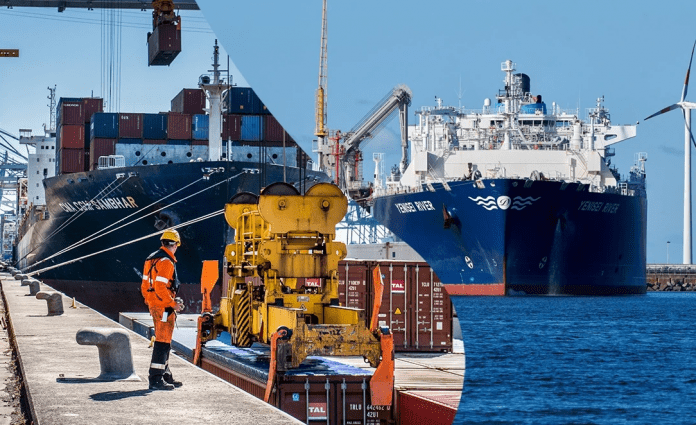In a move that could see further port mergers around the world, two major Belgian cargo hubs will unite after an agreement by the two cities of Antwerp and Bruges to combine their ports and create a giant European container port capable of delivering digital and green services to container shipping lines and other sectors.
[s2If is_user_logged_in()]The ports of Antwerp and Zeebrugge will be unified into a single port, which will operate under the name “Port of Antwerp Bruges”. The two-city agreement marks the official starting shot for a unification process that is expected to take one year, according to a statement.
The unified port, which will be operated by the City of Antwerp (80%) and the City of Bruges (20%), is expected to become a mega-container port with 157 million tonnes per year. Additionally, the Port of Antwerp Bruges will be one of the largest breakbulk ports and the largest one for vehicle transhipment in the continent.
“With this partnership, we are on the way to becoming the global port of Europe,” highlighted Annick De Ridder, port alderman of Antwerp and chairman of the board of directors of the Antwerp Port Authority, who added, “The ambition of merging the ports naturally goes even further than tonnes and TEUs. In this way, we can focus even more on the transition to a low-carbon economy and on the further digitization of the logistics chain.”
This is not the first time that ports have merged in Europe, as both HAROPA and North Sea Port are representative examples of the importance and the need in some cases for synergies. However, the Port of Antwerp-Burges will be the biggest merger so far and Container News understands this could herald other major ports mergers that can lead to greener synergies and environmentally-friendlier practices to the container port sector.
In a joint plan, both Belgian ports, which launched their co-operation discussions in 2018, have defined three strategic priorities, sustainable growth, resilience and leadership in the energy and digital transition.
The two partners believe that closer co-operation will perpetuate the sustainable growth of both the individual and the joint market share of both ports. The Port of Antwerp-Burges is drawing a map of interconnectivity in order to maximise the added value of the unification.
The two partners give an example in their joint announcement, freight rail transport between the two sites will be bundled, estuary navigation (by inland vessels on the North Sea) will be optimised and a connection via pipelines is also on the list of priorities.
The anticipated strategic investments, such as the new sea lock in Zeebrugge and the extra container capacity in Antwerp, will be continued, while future investments will be assessed from unified operational management.
Furthermore, the new port has announced its focus on the resources, knowledge and talent of the teams in Zeebrugge and Antwerp. In the near future, a unified organisational structure and way of working will be developed, with respect for each other’s DNA and corporate culture, according to the statement.
The partners said that the port wants to create as many synergies as possible, continue to build on broad social support for the motor of the Flemish economy and strengthen its position as a logistics, maritime and industrial centre worldwide.
Moreover, the port has announced its aim to follow the energy and digital transition proceeding with several projects on green hydrogen use, carbon reduction and technology innovations in the logistics and shipping industry.
“We will strengthen our joint economic and international position and at the same time create added value for the wider society,” stated Dirk De fauw, Mayor of Bruges and chairman of the Zeebrugge Port Authority.
The first chief executive officer of the new Belgian port will be Jacques Vandermeiren, who is currently the CEO of the port of Antwerp.
The transaction is subject to a number of customary conditions, including the approval of the Belgian competition authorities, while both parties aim to complete the transaction in the course of 2021.
[/s2If]
[s2If !is_user_logged_in()]Please login or register to read the rest of the story[/s2If]







